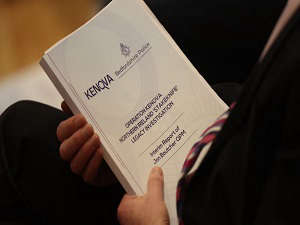
By Q Radio News
Lockdown easing in May caused economic output in Northern Ireland to rise at its fastest rate since 2014, according to an Ulster Bank survey.
While falling short of record highs, local firms did report the fastest rates of expansion in business activity and new orders in 40 months.
The survey is considered a reliable indicator of economic performance across the region.
Lockdown easing in May caused economic output in Northern Ireland to rise at its fastest rate since 2014, according to an Ulster Bank survey.https://t.co/3Mhots0whf
— Q Radio News (@qnewsdesk) June 14, 2021
Richard Ramsey, Chief Economist Northern Ireland, Ulster Bank said: "With the further loosening of lockdown restrictions, business conditions improved significantly in Northern Ireland. While falling short of record highs, local firms did report the fastest rates of expansion in business activity and new orders in 40 months. The last time local businesses posted faster rates of output growth was back in the summer of 2014.
“Northern Ireland’s services firms finally posted a pick-up in new orders for the first time since the pandemic took hold. Construction was the only sector not to see a pick-up in new orders with incoming demand falling significantly and marking the sixth successive month of decline. This contrasted starkly with UK construction firms which saw new orders hit the fastest growth rates to date.
“The rest of the local PMI survey was littered with highs. Strong growth in domestic demand has led to a pick-up in hiring with local firms increasing their headcount at the joint-fastest rate on record. Manufacturing led the way with staffing levels rising at the fastest pace in the survey’s history.
“The outlook is certainly improving with local firms the most optimistic about output in 12 months’ time in over three years and sentiment in manufacturing hitting a new survey high. Northern Ireland could well see a new high in output growth in the next month or two. Nevertheless, significant challenges remain. Global supply chain disruption and inflationary pressures, though expected to be transitory, will act as a headwind to the rapid recovery. Meanwhile as we saw last week, the continuing saga that is Brexit and the Northern Ireland Protocol, will be a source of political and economic turbulence for the foreseeable future.”

(Northern Ireland's economy showed signs of recovery in May)


 Bikers to descend on Westminster for veterans protest against Legacy Act repeal
Bikers to descend on Westminster for veterans protest against Legacy Act repeal
 Guidance sought over future of colourful parakeets in Belfast park
Guidance sought over future of colourful parakeets in Belfast park
 Woman released after questioning over pipe bombs in Co Down
Woman released after questioning over pipe bombs in Co Down
 Suspended chief constable will not be prosecuted over alleged sexual offences
Suspended chief constable will not be prosecuted over alleged sexual offences
 MI5 files not deliberately withheld from Stakeknife probe, review concludes
MI5 files not deliberately withheld from Stakeknife probe, review concludes